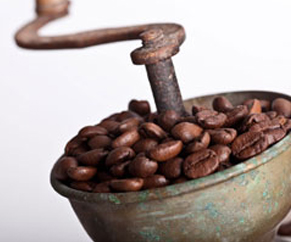Coffee Beginnings to Melitta in Modern Times
Historians are quite certain that coffee beans (actually "pits") were first eaten, not drunk, in Ethiopia, West Africa, around 575 A.D. There are several legends on how coffee was actually first discovered.
The most popular story takes place in the foothills of Yemen in 850 A.D. It is said that a goat herder named Kaldi discovered that his goats were eating the leaves and berries from an unknown tree with cherry-like fruit. After a full meal the goats became full of pep and energy. Some even say that they were dancing. Kaldi suspected that the intoxication was caused by the berry the goats were eating. He tried the berry himself and found that he too was suddenly energetic. Soon a monk noticed Kaldi's vigor and asked the goatherder what caused it. Kaldi told him about the plant and the monk picked the berries and brought them back to the monastery where the monks used them to stay awake for late night prayer and study.
Another story tells of a man condemned by his enemies to wander the desert and eventually die of starvation. In his delirium, the young man heard a voice instructing him to eat the fruit from a nearby coffee tree. Confused, he tried to soften the beans in water, and when this failed, he simply drank the liquid. Interpreting his survival and energy as a sign of God, he returned to his people, spreading the faith and the recipe.
While these stories are surely fiction, historians do agree on the following:
East African tribes would grind the coffee cherries together, mixing the results into a paste with animal fat. Rolled into little balls, the mixture was said to give warriors much-needed energy for battle. Later, around the year 1000 AD, Ethiopians concocted a type of wine from coffee berries, fermenting the dried beans in water. Coffee also grew naturally on the Arabian Peninsula, and it was there, during the 11thcentury that coffee was first developed into a hot drink. The so-called stimulating properties of coffee were thought by many during these ancient times to give a sort of religious ecstasy, and the drink earned a very mystical sort of reputation, shrouded in secrecy and associated with priests and doctors.
In 980 A.D., the great Arab scholar, Avicenna, praised coffee for its medicinal value, saying that it cured everything from earaches to eye strain to liver problems. The Hebrew edition of his greatest work, the Canon of Medicine, was published in Naples in 1491 and an Arabic edition in Rome in 1593.
In the 11thcentury in Mecca, a Muslim ruler, Sheik Abdul Hasan Schadhedi, boiled his Ethiopian coffee in magic water from a free-flowing well, separated the brew from the pit, roasted the pit, crushed it, mixed it with some boiled water, and gave it to townspeople who were sick with an unknown illness. The people were cured, and Sheik Schadhedi became a well-known physician.
The cultivation of coffee began sometime in the 15thcentury, and for many centuries to follow, the Yemen province of Arabia was the world's primary source of coffee. The demand for coffee in the Near East was very high. The beans leaving the Yemeni port of Mocha for trade with Alexandria and Constantinople were highly guarded. In fact, no fertile plants were allowed to leave the country. Despite the restrictions, Muslim pilgrims from across the globe during their pilgrimages to Mecca managed to smuggle coffee plants back to their homelands, and coffee crops soon took root in India. The first Middle Eastern coffee houses opened in the 14thcentury in present-day Yemen, Mecca, Damascus and Istanbul.
Ruling on behalf of the Sultan of Cairo, the governor of Mecca banned coffee in 1511, saying, "In coffeehouses men and women meet and play violins and chess, and do other things contrary to our sacred laws." Then he banned coffee completely. The Sultan ultimately realized that the governor banned coffee because "it stimulated the common customer of coffee houses to discuss the wrongdoings of [the governor.]” So he repealed the ban, discovered the corruption of the governor and had him put to death.





